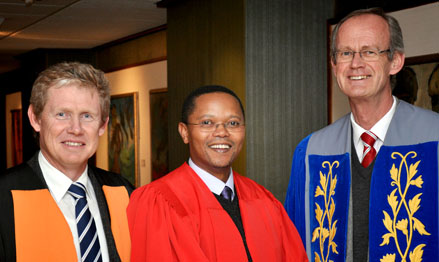Latest News Archive
Please select Category, Year, and then Month to display items
14 June 2024
|
Story Anthony Mthembu
|
Photo Suplied
 Jeremiah Hlahla, a UFS student completing his PhD in Botany at the University of Debrecen as part of an exchange initiative funded by the Erasmus+ Mobility Programme.
Jeremiah Hlahla, a UFS student completing his PhD in Botany at the University of Debrecen as part of an exchange initiative funded by the Erasmus+ Mobility Programme.
As part of an exchange initiative facilitated by the Erasmus+ Mobility Programme, Jeremiah Hlahla, a student at the University of the Free State (UFS), is nearing the completion of his PhD studies at the University of Debrecen in Hungary. Hlahla’s journey, which began in February 2024 and is set to conclude in July 2024, has been a remarkable learning opportunity. “As a first time-traveller to Europe, I have thoroughly enjoyed engaging with people from different countries and cultures,” he said.
The benefits of international collaboration
Hlahla is currently pursuing a PhD in Botany, focusing on plant stress physiology. “My current PhD project investigates the physiological, biochemical and morphological responses of vegetable-type soybean, or edamame, to combined drought and heat stress,’’ he explained. He considers the University of Debrecen the ideal institution to complete his research due to its extensive expertise and resources in similar projects. He noted that his colleagues at Debrecen conduct significant work on plant protection against biotic and abiotic stresses, including salt and drought stress, as well as proteins and amino acids in barley and other legumes.
Given the vast knowledge available on similar projects, Hlahla has found substantial engagement with his work at the University of Debrecen. “Upon arrival, I delivered an introductory lecture presenting my UFS project on the synergistic effects of combined drought and heat stress on the physiology and biochemistry of edamame. It was an engaging session as everyone could relate to my work and asked many questions,’’ he said.
Insights gained from the exchange
Hlahla has also gained valuable lessons that will assist him in his research career, including biotechnology and physiology tools. “I learned how to prepare samples and use high-performance liquid chromatography (HPLC) and reversed-phase ultra-high-performance liquid chromatography (UHPLC) to quantify proteins and amino acids,’’ he said. These techniques are beneficial not only for his current work but will also support future soybean research.
As his experience at the University of Debrecen nears its end, Hlahla reflects on the collaborations and friendships he has formed, which stand out as a significant highlight.
Inaugural lecture by Prof Kwandiwe Kondlo
2011-08-26
|

|
|
Present at the inaugural lecture of Prof Kwandiwe Kondlo were from the left: Prof. Lucius Botes, Dean of the Faculty of Humanities; Prof. Kwandiwe Kondlo and Prof. Teuns Verschoor, Vice-Rector: Institutional Affairs
Photo: Stephen Collett
|
Can the South African Communist Party (SACP) ever become a viable option for the ANC or has it become just a flat spare-tyre of the ruling party? Is there more to expect from the SACP or has it run full cycle? These are some of the questions that were brought up by Prof. Kwandiwe Kondlo at his inaugural lecture at our university on 24 August 2011.
Prof. Kondlo, head of our Centre for Africa Studies, told the audience that the current SACP (unlike pre-1994) is a party in which theory and intellectual reflection were being eclipsed by politics of pragmatism and warned that self-interest and ambition have become a problem. Delivering his lecture on the topic The South African Communist Party and the Dilemma of the National Democratic Revolution in South Africa, 1994 to date, Prof. Kondlo warned that he may ruffle feathers amongst those with ideological commitments and said that as an intellectual it was his job to irritate.
Prof. Kondlo told the audience his lecture would re-open old debates telling them that old questions are making way to the fore, for example the nationalisation debate.